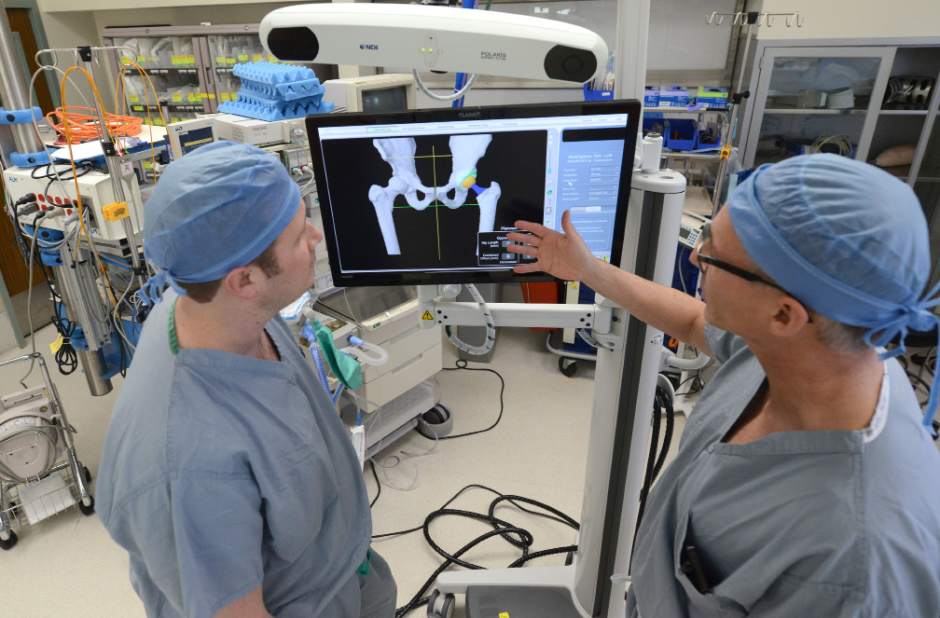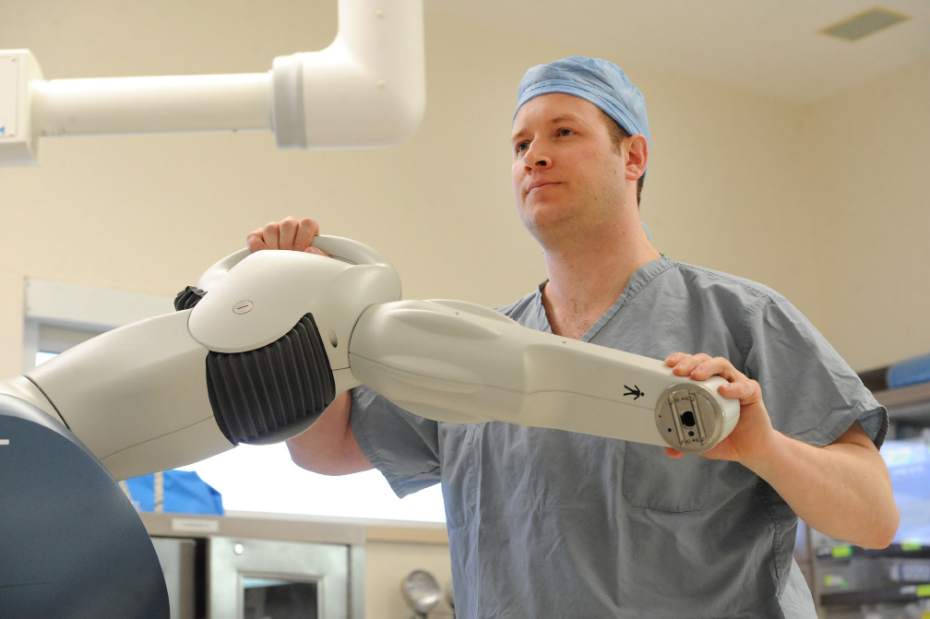Area surgeons find robots ease joint replacement operations
Robots designed to prevent orthopedic surgeons from making even slight mistakes could help protect thousands of hip and knee replacement patients from prolonged pain and extra operations, advocates say.
UPMC and Allegheny Health Network surgeons shared promising early trends last week from more than two dozen hip and partial knee replacements that used the computerized assistants at three Pittsburgh hospitals since late 2013. The devices, which can cost as much as $800,000, let doctors map operations and help guide surgical maneuvers, preventing unnecessary cuts that could complicate recovery or force a patient to return to the operating room.
“If we deviate from the plan more than half a millimeter, it will audibly beep at us and then just shut off. It really prevents technical mistakes,” said Dr. Michael Seel, the orthopedic surgery director at AHN-owned West Penn Hospital in Bloomfield.
West Penn surgeons began a yearlong pilot program in late January with a Robotic Arm Interactive System from Fort Lauderdale, Fla.-based Mako Surgical Corp. The system's Star Wars-like setup rivals similar technology from Pittsburgh-bred Blue Belt Technologies. West Penn doctors have completed 10 partial knee and hip replacements using the method, or about a quarter of those procedures at the hospital during the past several weeks.
Dr. Timothy J. Sauber, a West Penn surgeon, said the technology allows less invasive procedures with precise alignment for implants and fewer disruptions of tissue.
He said the more targeted approach could save some patients from total-knee replacement and redirect them to partial-knee operations, a lower-impact procedure that often results in shorter hospital stays and recovery periods.
“It's a drastic difference,” Sauber said, citing recoveries that can run about six weeks for partial-knee replacements. The timeline can be closer to three months for total-knee replacements.
At least 15 percent of partial-knee replacements nationwide incorporate robotics, a number that's expected to climb, according to industry estimates.
Magee-Womens Hospital in Oakland has completed about 25 partial-knee operations using Blue Belt's Navio Surgical System since late 2013, said Dr. Brian R. Hamlin, associate director at the Magee Bone and Joint Center. AHN-owned Allegheny General Hospital in the North Side is running a 60-day trial with the system, a spokeswoman said.
Plymouth, Minn.-based Blue Belt grew out of the Robotics Institute at Carnegie Mellon University in Oakland. Health care providers have installed more than 40 of its orthopedic robotic systems. More than two dozen are in the United States, according to the company. The technology has yet to prove that it's more effective than human hands alone, according to skeptics.
“Every hospital wants to get one because they can advertise that they have it,” said Dr. William Jiranek, chief of adult reconstruction at the School of Medicine at Virginia Commonwealth University in Richmond. He said he hasn't seen data demonstrating the clinical efficacy of relying on robotics.
Instead, Jiranek said surgery without robotics could give surgeons more space to handle unexpected factors that computer algorithms don't take into account, at least for now.
Clinicians in the United States perform more than 400,000 total and partial-hip replacements and more than 600 total knee replacements each year, according to the federal Agency for Healthcare Research and Quality. Partial-knee replacement totals were not available.
Partial-knee replacements with robotic assistance have failure rates up to nine times lower than conventional procedures, according to medical device industry figures. As many as 15 percent of the operations fail within 10 years and can lead to additional operations, doctors said.
For Tom Moran, 49, of Shaler, recovery after his right hip replacement has been easier than he expected. West Penn doctors used the Mako device on him about six weeks ago.
“I was surprised that after two weeks, I was walking without a cane,” said Moran, whose pain has subsided. He's eager to return to golfing.
“I got my legs back.”
Adam Smeltz is a staff writer for Trib Total Media. He can be reached at 412-380-5676 or asmeltz@tribweb.com.



